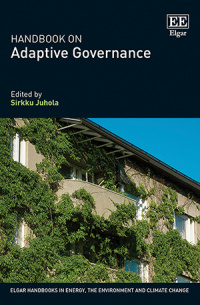
Hardback
Dealing with Crisis
The Japanese Experience and Beyond
9781035300655 Edward Elgar Publishing
This is an open access title available under the terms of a CC BY-NC-ND 4.0 License. It is free to read, download and share on Elgaronline.com.
Reflecting on the depth of the experience with crises, this innovative book demonstrates what the world can learn from insights into crises from the Japanese perspective. Taking an institutionalist approach with a strong historical precedent, leading scholars in the social sciences and law explore how better to deal with foreseeable and unforeseen crises.
Reflecting on the depth of the experience with crises, this innovative book demonstrates what the world can learn from insights into crises from the Japanese perspective. Taking an institutionalist approach with a strong historical precedent, leading scholars in the social sciences and law explore how better to deal with foreseeable and unforeseen crises.
More Information
Critical Acclaim
More Information
Reflecting on the depth of the experience with crises, this innovative book demonstrates what the world can learn from insights into crises from the Japanese perspective. Taking an institutionalist approach with a strong historical precedent, leading scholars in the social sciences and law explore how better to deal with both foreseeable and unforeseen crises.
Illustrating their multifaceted and complex nature, the book examines a broad range of crises throughout history, including economic, fiscal and political crises; force majeure events such as pandemics and natural disasters; and military conflicts and acts of war. Chapters consider how various actors anticipate and deal with these crises, looking closely at their different perceptions of crisis and varying degrees of urgency. Analyzing institutional design and response, and the impact of psychological factors on disaster preparedness, the book considers how the decision-making capabilities of individuals can be enhanced to improve institutional capacity.
Transdisciplinary, with an international reach, this topical book will prove invaluable to students and scholars across the social sciences, particularly those interested in Asian politics and environmental policy, disaster preparedness and institutional design. It also provides guidance for policymakers working in civil code reform.
Illustrating their multifaceted and complex nature, the book examines a broad range of crises throughout history, including economic, fiscal and political crises; force majeure events such as pandemics and natural disasters; and military conflicts and acts of war. Chapters consider how various actors anticipate and deal with these crises, looking closely at their different perceptions of crisis and varying degrees of urgency. Analyzing institutional design and response, and the impact of psychological factors on disaster preparedness, the book considers how the decision-making capabilities of individuals can be enhanced to improve institutional capacity.
Transdisciplinary, with an international reach, this topical book will prove invaluable to students and scholars across the social sciences, particularly those interested in Asian politics and environmental policy, disaster preparedness and institutional design. It also provides guidance for policymakers working in civil code reform.
Critical Acclaim
‘Extrapolating lessons from the diverse Japanese experience with disasters, this timely book investigates what policymakers, institutions and individual actors can do when a crisis, in all its unforeseen and multi-faceted complexity, strikes. Multidisciplinary in scope, it makes an important, wide-ranging and fascinating contribution to global crisis studies and disaster management research.’
– Leon Wolff, Hitotsubashi University, Japan
‘An intriguing interdisciplinary collection analysing crises in Japan, whose history has been punctuated by natural and socio-economic disasters. The book uncovers insights into how people think about crisis, the 2011 Great Eastern Japan Earthquake impacts, legal and governmental responses, and how modern Japan’s approach to crises has evolved regarding China. Curated from a University of Tokyo project over 2016-2020, the chapters also set a useful backdrop to assess Japan’s COVID-19 pandemic management.’
– Luke Nottage, Sydney Law School, Australia
– Leon Wolff, Hitotsubashi University, Japan
‘An intriguing interdisciplinary collection analysing crises in Japan, whose history has been punctuated by natural and socio-economic disasters. The book uncovers insights into how people think about crisis, the 2011 Great Eastern Japan Earthquake impacts, legal and governmental responses, and how modern Japan’s approach to crises has evolved regarding China. Curated from a University of Tokyo project over 2016-2020, the chapters also set a useful backdrop to assess Japan’s COVID-19 pandemic management.’
– Luke Nottage, Sydney Law School, Australia




